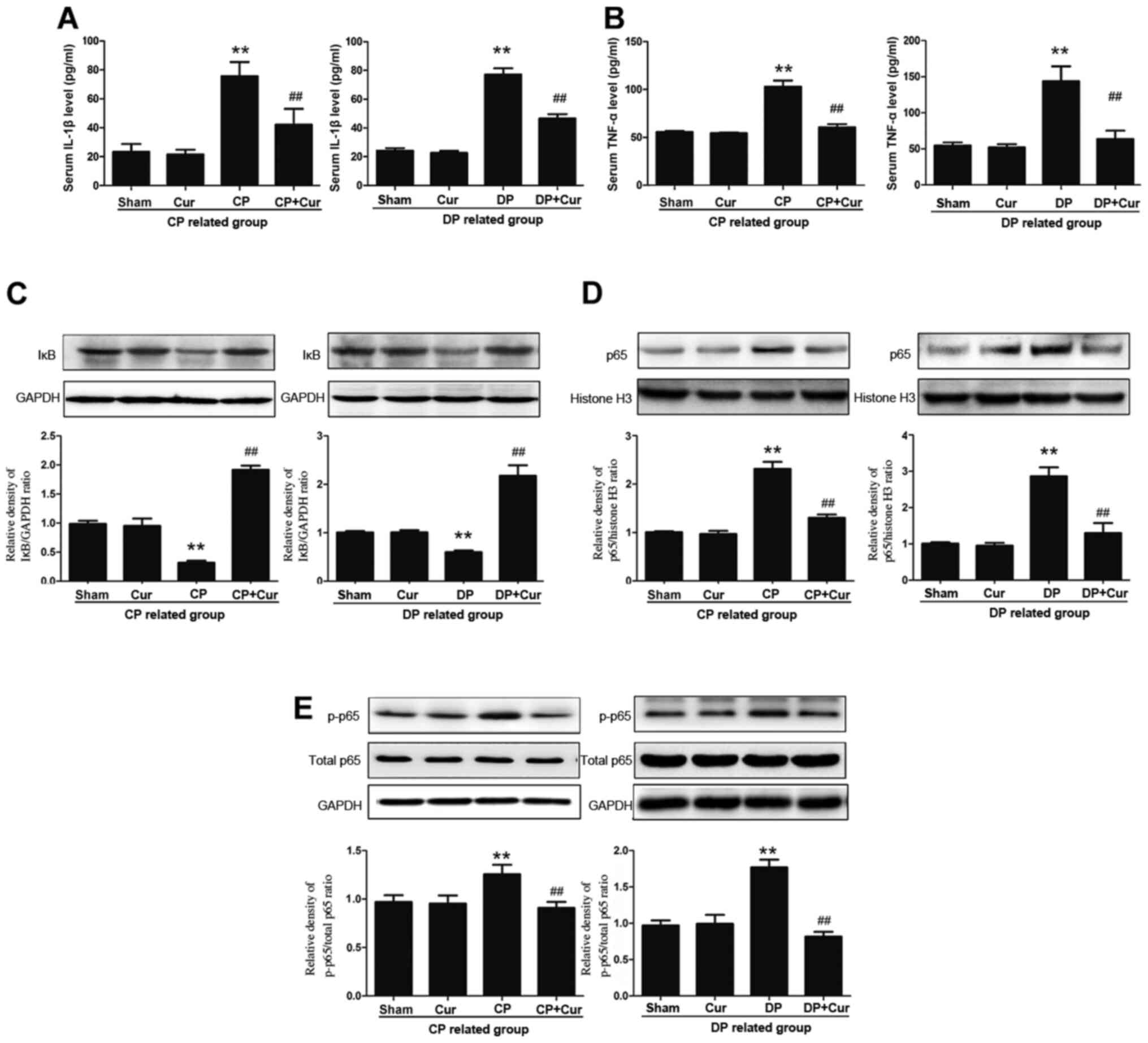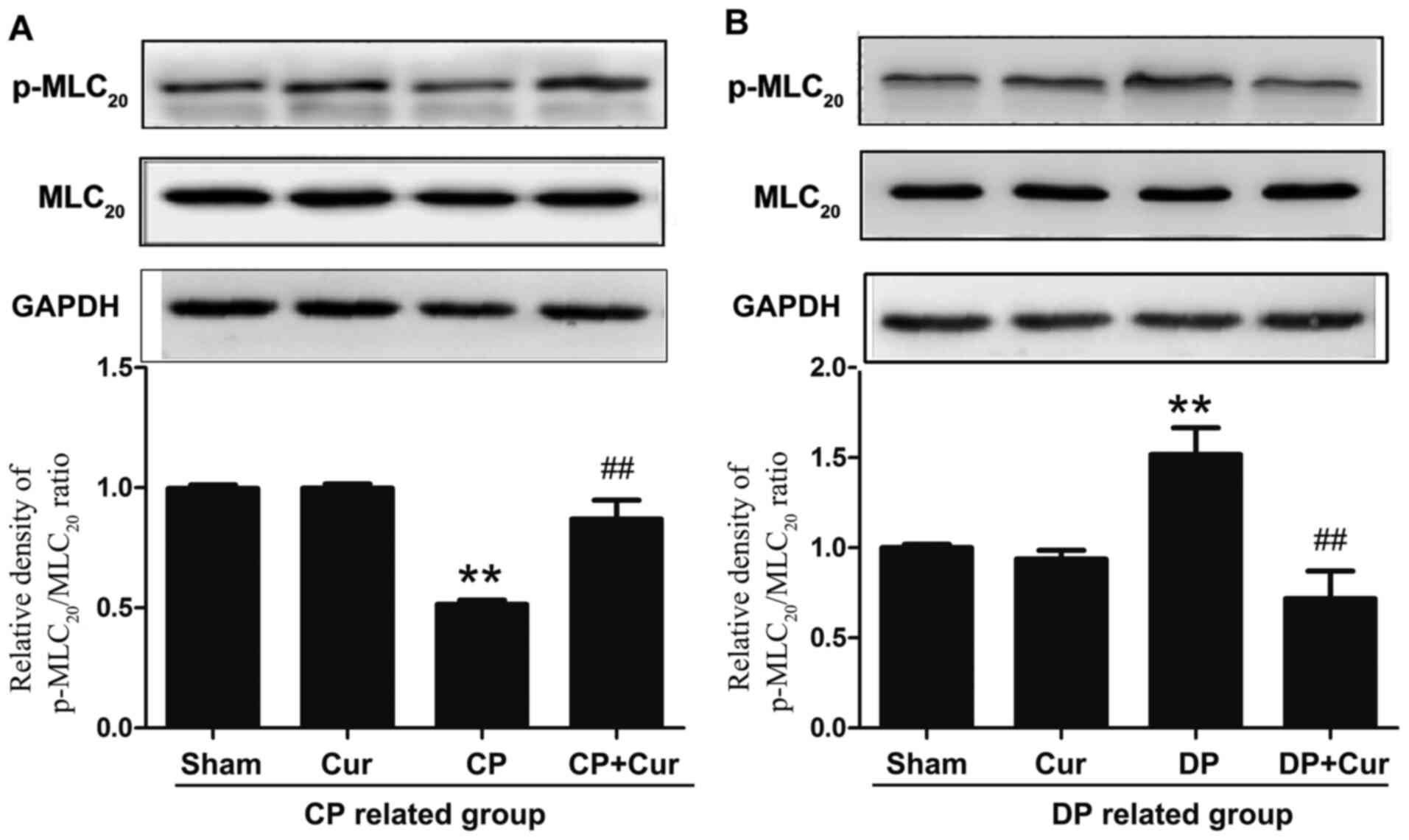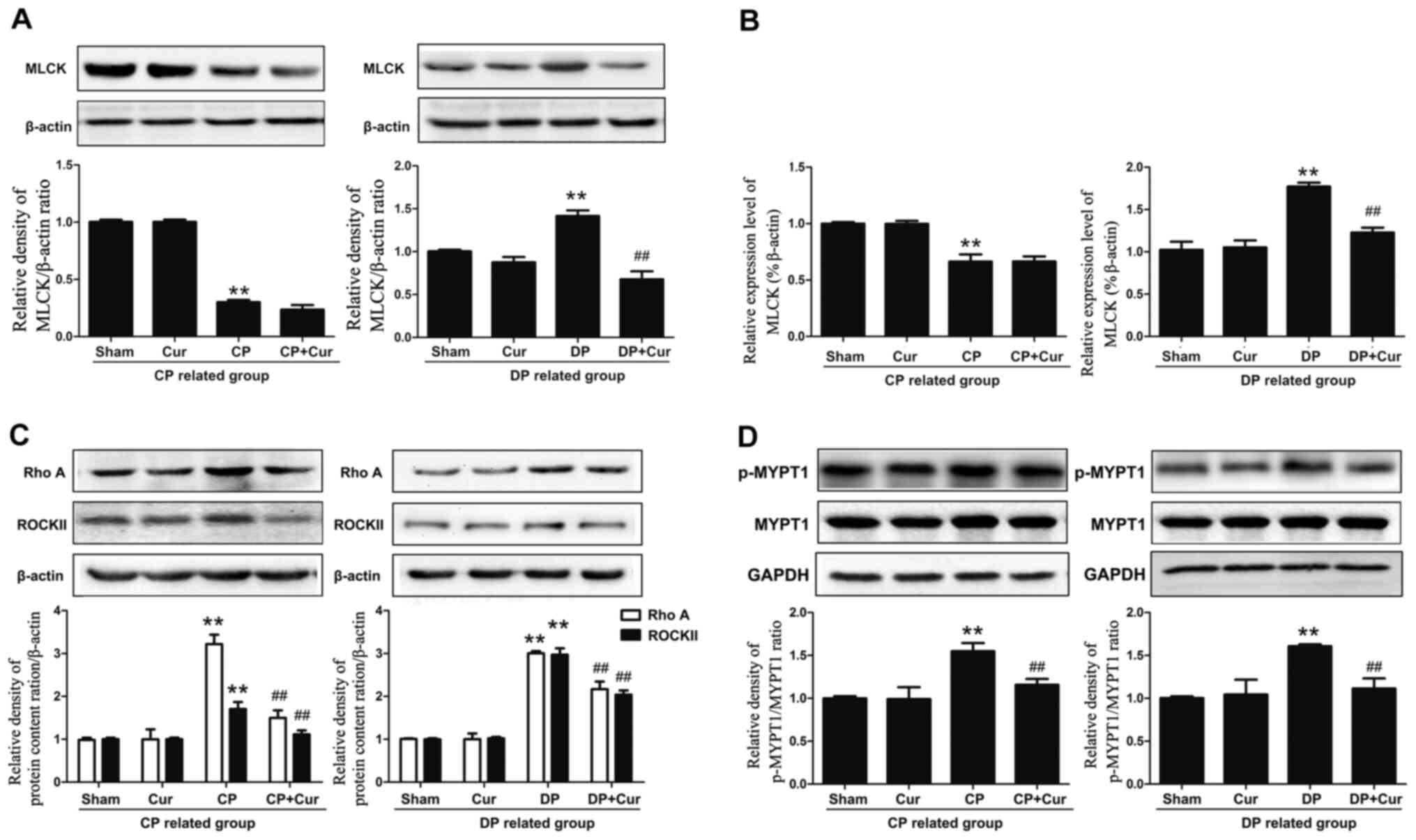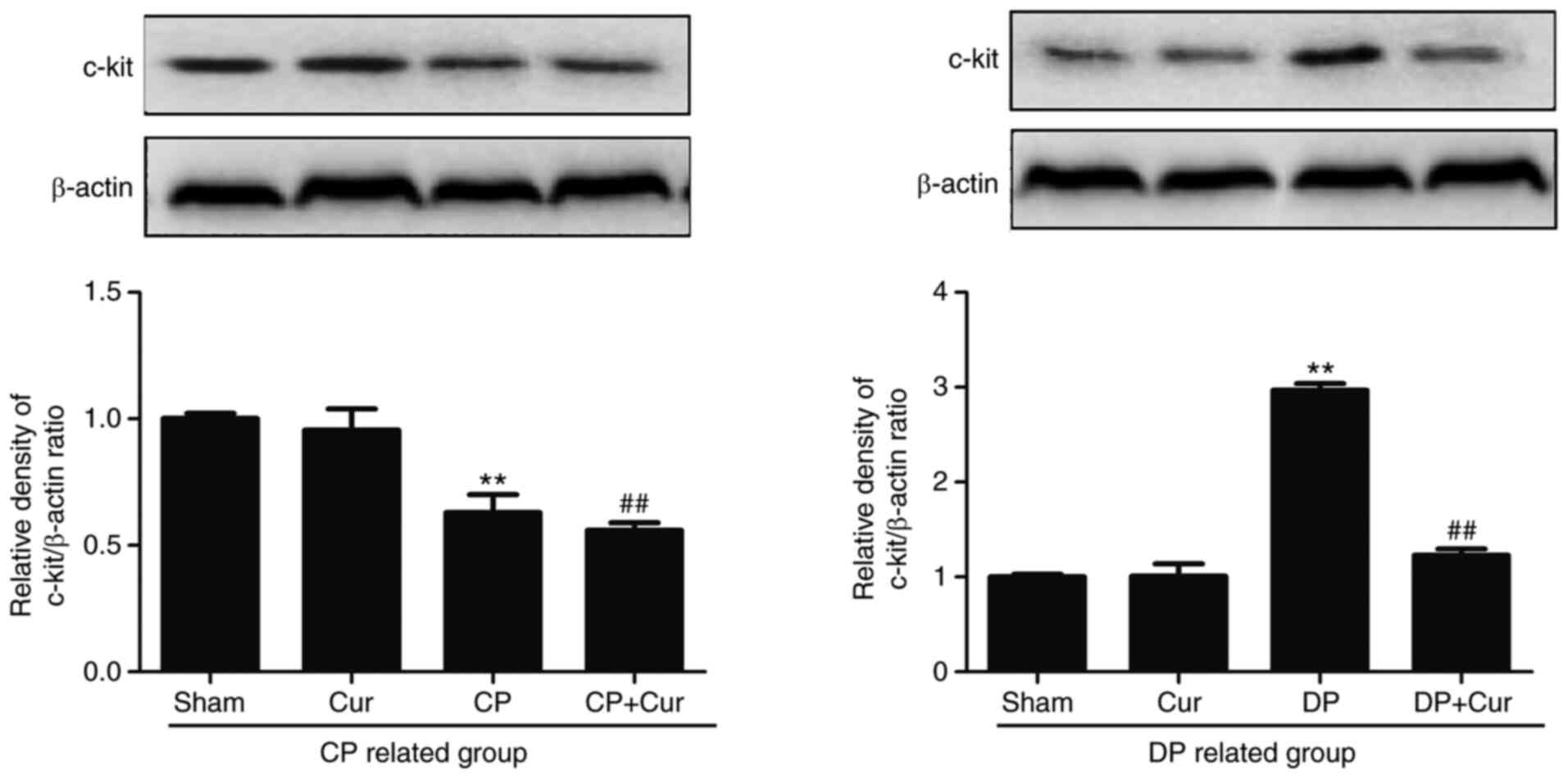|
1
|
Lestari ML and Indrayanto G: Curcumin.
Profiles Drug Subst Excip Relat Methodol. 39:113–204. 2014.
View Article : Google Scholar : PubMed/NCBI
|
|
2
|
Prasad S, Gupta SC, Tyagi AK and Aggarwal
BB: Curcumin, a component of golden spice: From bedside to bench
and back. Biotechnol Adv. 32:1053–1064. 2014. View Article : Google Scholar : PubMed/NCBI
|
|
3
|
Aggarwal BB, Yuan W, Li S and Gupta SC:
Curcumin-free turmeric exhibits anti-inflammatory and anticancer
activities: Identification of novel components of turmeric. Mol
Nutr Food Res. 57:1529–1542. 2013. View Article : Google Scholar : PubMed/NCBI
|
|
4
|
Homayouni A, Amini M, Sohrabi M, Varshosaz
J and Nokhodchi A: Curcumin nanoparticles containing poloxamer or
soluplus tailored by high pressure homogenization using antisolvent
crystallization. Int J Pharm. 562:124–134. 2019. View Article : Google Scholar : PubMed/NCBI
|
|
5
|
Ridzuan NRA, Rashid NA, Othman F, Budin
SB, Hussan F and Teoh SL: Protective role of natural products in
cisplatin-induced nephrotoxicity. Mini Rev Med Chem. 19:1134–1143.
2019. View Article : Google Scholar : PubMed/NCBI
|
|
6
|
Wong KE, Ngai SC, Chan KG, Lee LH, Goh BH
and Chuah LH: Curcumin Nanoformulations for Colorectal Cancer: A
Review. Front Pharmacol. 10:1522019. View Article : Google Scholar : PubMed/NCBI
|
|
7
|
Ozaki H, Hori M, Kinoshita K and Ohama T:
Intestinal dysmotility in inflammatory bowel disease: Mechanisms of
the reduced activity of smooth muscle contraction.
Inflammopharmacology. 13:103–111. 2005. View Article : Google Scholar : PubMed/NCBI
|
|
8
|
Du X, Allwood G, Webberley KM, Inderjeeth
AJ, Osseiran A and Marshall BJ: Noninvasive diagnosis of irritable
bowel syndrome via bowel sound features: Proof of concept. Clin
Transl Gastroenterol. 10:e000172019. View Article : Google Scholar : PubMed/NCBI
|
|
9
|
Ng QX, Soh AYS, Loke W, Venkatanarayanan
N, Lim DY and Yeo WS: A Meta-analysis of the clinical use of
curcumin for irritable bowel syndrome (IBS). J Clin Med. 7:2982018.
View Article : Google Scholar
|
|
10
|
Goulart RA, Barbalho SM, Lima VM, Souza
GA, Matias JN, Araújo AC, Rubira CJ, Buchaim RL, Buchaim DV,
Carvalho ACA and Guiguer ÉL: Effects of the use of curcumin on
ulcerative colitis and Crohn's disease: A systematic review. J Med
Food. Nov 5–2020.(Epub of print). View Article : Google Scholar : PubMed/NCBI
|
|
11
|
Horii K, Ehara Y, Shiina T, Naitou K,
Nakamori H, Horii Y, Shimaoka H, Saito S and Shimizu Y: Sexually
dimorphic response of colorectal motility to noxious stimuli in the
colorectum in rats. J Physiol. 2020.(Ahead of print). PubMed/NCBI
|
|
12
|
Chen D, Xiong Y, Wang L, Lv B and Lin Y:
Characteristics of emodin on modulating the contractility of
jejunal smooth muscle. Can J Physiol Pharmacol. 90:455–462. 2012.
View Article : Google Scholar : PubMed/NCBI
|
|
13
|
Zou BC, Dong L, Wang Y, Wang SH and Cao
MB: Expression and role of 5-HT7 receptor in brain and intestine in
rats with irritable bowel syndrome. Chin Med J (Engl).
120:2069–2074. 2007. View Article : Google Scholar : PubMed/NCBI
|
|
14
|
La JH, Kim TW, Sung TS, Kang JW, Kim HJ
and Yang IS: Visceral hypersensitivity and altered colonic motility
after subsidence of inflammation in a rat model of colitis. World J
Gastroenterol. 9:2791–2795. 2003. View Article : Google Scholar : PubMed/NCBI
|
|
15
|
Peng HY, Yeh CM, Cheng JK, Chau YP, Ruan
T, Chen GD, Hsieh MC, Lai CY and Lin TB: Acute uterine irritation
provokes colonic motility via transient receptor potential
A(1)-dependent spinal NR2B phosphorylation in rats. Anesthesiology.
120:436–446. 2014. View Article : Google Scholar : PubMed/NCBI
|
|
16
|
Qi DB and Li WM: Effects of
electroacupuncture on expression of c-fos protein in the spinal
dorsal horn of rats with chronic visceral hyperalgesia. Zhong Xi Yi
Jie He Xue Bao. 10:1490–1496. 2012. View Article : Google Scholar : PubMed/NCBI
|
|
17
|
Livak KJ and Schmittgen TD: Analysis of
relative gene expression data using real-time quantitative PCR and
the 2(-Delta Delta C(T)) method. Methods. 25:402–408. 2001.
View Article : Google Scholar : PubMed/NCBI
|
|
18
|
Ohama T, Hori M, Momotani E, Iwakura Y,
Guo F, Kishi H, Kobayashi S and Ozaki H: Intestinal inflammation
downregulates smooth muscle CPI-17 through induction of TNF-alpha
and causes motility disorders. Am J Physiol Gastrointest Liver
Physiol. 292:G1429–G1438. 2007. View Article : Google Scholar : PubMed/NCBI
|
|
19
|
Chen DP, Xiong YJ, Tang ZY, Yao QY, Ye DM,
Liu SS and Lin Y: Characteristics of deslanoside-induced modulation
on jejunal contractility. World J Gastroenterol. 18:5889–5896.
2012. View Article : Google Scholar : PubMed/NCBI
|
|
20
|
Kim HH, Kim DS, Kim SW, Lim SH, Kim DK,
Shin TY and Kim SH: Inhibitory effects of Diospyros kaki in a model
of allergic inflammation: Role of cAMP, calcium and nuclear
factor-κB. Int J Mol Med. 32:945–951. 2013. View Article : Google Scholar : PubMed/NCBI
|
|
21
|
Zhang W, Sun J, Shen X, Xue Y, Yuan S and
Wang X: Effect of PA-MSAH preprocessing on the expression of
TLR-4-NF-κB pathway and inflammatory factors in the intestinal
tract of rats with septic shock. Exp Ther Med. 17:2567–2574.
2019.PubMed/NCBI
|
|
22
|
Sun G, Xing C, Zeng L, Huang Y, Sun X and
Liu Y: Flemingia philippinensis Flavonoids Relieve Bone Erosion and
Inflammatory Mediators in CIA Mice by Downregulating NF-κB and MAPK
Pathways. Mediators Inflamm. 2019:57902912019. View Article : Google Scholar : PubMed/NCBI
|
|
23
|
Xu Z, Liang H, Zhang M, Tao X, Dou D, Hu L
and Kang T: Ardipusilloside-I stimulates gastrointestinal motility
and phosphorylation of smooth muscle myosin by myosin light chain
kinase. Korean J Physiol Pharmacol. 21:609–616. 2017. View Article : Google Scholar : PubMed/NCBI
|
|
24
|
Chang AN, Mahajan P, Knapp S, Barton H,
Sweeney HL, Kamm KE and Stull JT: Cardiac myosin light chain is
phosphorylated by Ca2+/calmodulin-dependent and -independent kinase
activities. Proc Natl Acad Sci USA. 113:E3824–E3833. 2016.
View Article : Google Scholar : PubMed/NCBI
|
|
25
|
Somlyo AP and Somlyo AV: Ca2+ sensitivity
of smooth muscle and nonmuscle myosin II: Modulated by G proteins,
kinases, and myosin phosphatase. Physiol Rev. 83:1325–1358. 2003.
View Article : Google Scholar : PubMed/NCBI
|
|
26
|
Martelli L, Ragazzi E, di Mario F,
Martelli M, Castagliuolo I, Dal Maschio M, Palu G, Maschietto M,
Scorzeto M, Vassanelli S and Brun P: A potential role for the
vanilloid receptor TRPV1 in the therapeutic effect of curcumin in
dinitrobenzene sulphonic acid-induced colitis in mice.
Neurogastroenterol Motil. 19:668–674. 2007. View Article : Google Scholar : PubMed/NCBI
|
|
27
|
Der T, Bercik P, Donnelly G, Jackson T,
Berezin I, Collins SM and Huizinga JD: Interstitial cells of cajal
and inflammation-induced motor dysfunction in the mouse small
intestine. Gastroenterology. 119:1590–1599. 2000. View Article : Google Scholar : PubMed/NCBI
|
|
28
|
Jo HJ, Kim N, Nam RH, Kang JM, Kim JH,
Choe G, Lee HS, Park JH, Chang H, Kim H, et al: Fat deposition in
the tunica muscularis and decrease of interstitial cells of Cajal
and nNOS-positive neuronal cells in the aged rat colon. Am J
Physiol Gastrointest Liver Physiol. 306:G659–G669. 2014. View Article : Google Scholar : PubMed/NCBI
|
|
29
|
Szałwińska P, Włodarczyk J, Spinelli A,
Fichna J and Włodarczyk M: IBS-Symptoms in IBD
patients-manifestation of concomitant or different entities. J Clin
Med. 10:312020. View Article : Google Scholar
|
|
30
|
Kamiya T, Shikano M, Tanaka M, Ozeki K,
Ebi M, Katano T, Hamano S, Nishiwaki H, Tsukamoto H, Mizoshita T,
et al: Therapeutic effects of biobran, modified arabinoxylan rice
bran, in improving symptoms of diarrhea predominant or mixed type
irritable bowel syndrome: A pilot, randomized controlled study.
Evid Based Complement Alternat Med. 2014:8281372014. View Article : Google Scholar : PubMed/NCBI
|
|
31
|
Yarandi SS, Hebbar G, Sauer CG, Cole CR
and Ziegler TR: Diverse roles of leptin in the gastrointestinal
tract: Modulation of motility, absorption, growth, and
inflammation. Nutrition. 27:269–275. 2011. View Article : Google Scholar : PubMed/NCBI
|
|
32
|
Welch MG, Margolis KG, Li Z and Gershon
MD: Oxytocin regulates gastrointestinal motility, inflammation,
macromolecular permeability, and mucosal maintenance in mice. Am J
Physiol Gastrointest Liver Physiol. 307:G848–G862. 2014. View Article : Google Scholar : PubMed/NCBI
|
|
33
|
Jobin C, Bradham CA, Russo MP, Juma B,
Narula AS, Brenner DA and Sartor RB: Curcumin blocks
cytokine-mediated NF-kappa B activation and proinflammatory gene
expression by inhibiting inhibitory factor I-kappa B kinase
activity. J Immunol. 163:3474–3483. 1999.PubMed/NCBI
|
|
34
|
Zhu T, Chen Z, Chen G, Wang D, Tang S,
Deng H, Wang J, Li S, Lan J, Tong J, et al: Curcumin attenuates
asthmatic airway inflammation and mucus hypersecretion involving a
PPARγ-Dependent NF-κB signaling pathway in vivo and in vitro.
Mediators Inflamm. 2019:49274302019. View Article : Google Scholar : PubMed/NCBI
|
|
35
|
Torres J, Ellul P, Langhorst J,
Mikocka-Walus A, Barreiro-de Acosta M, Basnayake C, Ding NJS,
Gilardi D, Katsanos K, Moser G, et al: European crohn's and colitis
organisation topical review on complementary medicine and
psychotherapy in inflammatory bowel disease. J Crohns Colitis.
13:673–685e. 2019. View Article : Google Scholar : PubMed/NCBI
|
|
36
|
Larmonier CB, Midura-Kiela MT, Ramalingam
R, Laubitz D, Janikashvili N, Larmonier N, Ghishan FK and Kiela PR:
Modulation of neutrophil motility by curcumin: Implications for
inflammatory bowel disease. Inflamm Bowel Dis. 17:503–515. 2011.
View Article : Google Scholar : PubMed/NCBI
|
|
37
|
Álvarez-Santos MD, Álvarez-González M,
Estrada-Soto S and Bazán-Perkins B: Regulation of myosin
light-chain phosphatase activity to generate airway smooth muscle
hypercontractility. Front Physiol. 11:7012020. View Article : Google Scholar : PubMed/NCBI
|
|
38
|
Rajagopal S, Kumar DP, Mahavadi S,
Bhattacharya S, Zhou R, Corvera CU, Bunnett NW, Grider JR and
Murthy KS: Activation of G protein-coupled bile acid receptor,
TGR5, induces smooth muscle relaxation via both Epac- and
PKA-mediated inhibition of RhoA/Rho kinase pathway. Am J Physiol
Gastrointest Liver Physiol. 304:G527–G535. 2013. View Article : Google Scholar : PubMed/NCBI
|
|
39
|
Moreno-Dominguez A, Colinas O, El-Yazbi A,
Walsh EJ, Hill MA, Walsh MP and Cole WC: Ca2+
sensitization due to myosin light chain phosphatase inhibition and
cytoskeletal reorganization in the myogenic response of skeletal
muscle resistance arteries. J Physiol. 591:1235–1250. 2013.
View Article : Google Scholar : PubMed/NCBI
|
|
40
|
Grassie ME, Moffat LD, Walsh MP and
MacDonald JA: The myosin phosphatase targeting protein (MYPT)
family: A regulated mechanism for achieving substrate specificity
of the catalytic subunit of protein phosphatase type 1δ. Arch
Biochem Biophys. 510:147–159. 2011. View Article : Google Scholar : PubMed/NCBI
|
|
41
|
Drumm BT, Rembetski BE, Messersmith K,
Manierka MS, Baker SA and Sanders KM: Pacemaker function and neural
responsiveness of subserosal interstitial cells of Cajal in the
mouse colon. J Physiol. 598:651–681. 2020. View Article : Google Scholar : PubMed/NCBI
|
|
42
|
Somlyo AP and Somlyo AV: Smooth muscle:
Excitation- contraction coupling, contractile regulation, and the
cross-bridge cycle. Alcohol Clin Exp Res. 18:138–143. 1994.
View Article : Google Scholar : PubMed/NCBI
|
|
43
|
Wei J, Li N, Xia X, Chen X, Peng F, Besner
GE and Feng J: Effects of lipopolysaccharide-induced inflammation
on the interstitial cells of Cajal. Cell Tissue Res. 356:29–37.
2014. View Article : Google Scholar : PubMed/NCBI
|
|
44
|
Fallahi F, Borran S, Ashrafizadeh M,
Zarrabi A, Pourhanifeh MH, Khaksary Mahabady M, Sahebkar A and
Mirzaei H: Curcumin and inflammatory bowel diseases: From in vitro
studies to clinical trials. Mol Immunol. 130:20–30. 2020.
View Article : Google Scholar : PubMed/NCBI
|
|
45
|
Qiao P, Ma J, Wang Y, Huang Z, Zou Q, Cai
Z and Tang Y: Curcumin prevents neuroinflammation by inducing
microglia to transform into the M2-phenotype via CaMKKβ-dependent
activation of the AMP-activated protein kinase signal pathway. Curr
Alzheimer Res. 17:735–752. 2020. View Article : Google Scholar : PubMed/NCBI
|
|
46
|
Bardak H, Uğuz AC and Bardak Y: Curcumin
regulates intracellular calcium release and inhibits oxidative
stress parameters, VEGF, and caspase-3/-9 levels in human retinal
pigment epithelium cells. Physiol Int. 104:301–315. 2017.
View Article : Google Scholar : PubMed/NCBI
|



















